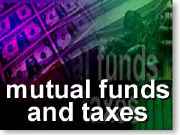|
Funds that limit tax pinch
|
 |
April 13, 1999: 10:18 a.m. ET
A handful of tax-managed funds try to reduce your liability for capital gains
|
NEW YORK (CNNfn) - One of the darkest family secrets in the mutual-fund industry is that taxes can wipe out a sizeable chunk of your investment returns.
But most investors remain woefully uninformed about the tax implications of a fund manager's trading decisions, some industry pros say.
"Most investors have been in the dark," said Neil Wolfson, a tax expert and a principal at KPMG in New York.
That is probably why there are thousands of mutual funds but only about 30 that are "tax-managed," said Joel Dickson, a principal at Vanguard Group, a fund family based in Valley Forge, Pa.
Managers of tax-managed funds make trades specifically to limit the tax tab, while "tax-sensitive" funds like index funds have strategies that naturally create less tax burden. Vanguard offers four tax-managed portfolios and a range of index funds.
"Taxes are the single largest cost for shareholders," Dickson said.
Taxes eat up about 2.5 percent a year in profits from a typical equity fund, he said. By contrast, Vanguard's tax-managed funds lose less than 0.3 percent a year to taxes.
Managers pass along capital gains distributions by the end of the year. By law, you pay 20 percent on long-term capital gains held longer than a year but up to 39.6 percent on short-term gains held less than a year.
If your fund has a high turnover rate, meaning the manager buys and sells a lot of stocks during the year, you could be writing a big check to Uncle Sam this week. Likewise, if a fund holds stocks that have increased a lot in value, it could raise your bill.
Tax-limiting strategies
A tax-conscious manager can use different accounting strategies to limit the tax bite, Dickson said. For example, he may have bought shares of IBM (IBM) at $100, and later bought more of the stock at $150. If he's selling at a time when the stock is trading at $125, he can sell the first basket of shares at a gain or the second basket of shares at a loss.
Tax-managed funds will also focus on stocks that have low dividend yields to limit the distributions you'll pay, he said.
Managers will comb through their portfolio to look for stocks that have losses so they can use them to offset any gains. And they may charge high redemption fees for people who hold the funds for a short time.
Many of the 22 tax-managed funds tracked by Morningstar are so new that they do not have a proven track record, said Laura Lallos, an analyst at fund-researcher Morningstar. But she recommends Schwab 1000 Fund; Vanguard Tax-Managed Growth & Income Fund; Vanguard Tax-Managed Balanced Fund; and Standish Tax-Sensitive Equity Fund, among a few other names.
A new study by KPMG found that tax-managed funds do not suffer lower returns because of their strategies, Wolfson said.
But Lallos said it is hard to make a general statement about tax-managed funds.
"Some tax-managed funds do well, some don't," Lallos said. "Whether or not they've done well depends on what they've invested in." 
-- by staff writer Martine Costello
|
|
|
|
|
 |

|

